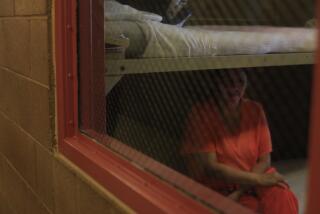U.S. Officials Criticize Hyperthermia AIDS Treatment : Health: Inquiry finds no benefit from the controversial procedure. Nor does it find any reason to encourage further experiments.
- Share via
WASHINGTON — There is no evidence that the highly publicized heat treatment known as hyperthermia can help AIDS patients, nor is there any reason to encourage further experiments with the procedure, federal health officials said Tuesday.
The National Institute of Allergy and Infectious Diseases, the federal government’s lead AIDS research agency, said that an investigation conducted by its researchers showed “no clinical, immunologic or virologic support” for the use of hyperthermia to treat AIDS or Kaposi’s sarcoma, an AIDS-related cancer.
Further, the agency said, “neither does there appear (to be) any support for further human experimentation in this area at this time.”
The controversial treatment, which involves removing the patient’s blood, heating it to about 115 degrees Farenheit and then returning it to his body, has received considerable public attention in recent months after two patients were treated with the procedure in Atlanta by Dr. Kenneth Alonso, a pathologist, and Dr. William Logan Jr., a surgeon. A third patient, who was treated with hyperthermia in August in Mexico by Alonso, died several hours later.
Hyperthermia has been used during the last two decades as a treatment for various cancers, but usually in combination with chemotherapy, radiation or other therapies. Its use as a single form of cancer therapy “is unwarranted because the clinical response is so short,” the federal institute said.
The use of hyperthermia as an AIDS treatment has been met with both widespread interest and skepticism by members of the AIDS community, many of whom criticized Alonso and his patients for promoting a procedure before it had been thoroughly studied.
“This is another example of why we’ve got to be careful before we jump on claims, be they from physician or patient, of a new treatment or cure for HIV,” said Dr. Anthony Fauci, the director of the institute.
Fauci, in an interview, said that such experimental treatments should not be considered “until we have adequate scrutiny of data that has been peer-reviewed.”
But Alonso called the infectious disease institute’s report “ludicrous” and said in an interview that the investigators “have basically ignored any and all evidence that does not support their position.”
When asked if he would perform the procedure again, Alonso replied: “Most likely.”
The National Institute of Allergy and Infectious Diseases investigation was initiated by Alonso himself, who asked the agency to evaluate the technique and its results. The federal team was headed by Dr. Lawrence Deyton, assistant director for community research at the institute and chief of the community clinical research branch of its AIDS program.
Deyton requested the outside assistance of Dr. Ian Robins, chief of medical oncology at the University of Wisconsin and a leading authority on the clinical uses of hyperthermia, and Dr. Ramon Torres, a New York physician with a large AIDS practice and a member of the AIDS clinical drug development committee, which advises the institute on promising new therapies.
The institute said that throughout its investigation Alonso and Logan “acted with professionalism, openness and a desire to help their patients with HIV disease.”
The first patient to undergo hyperthermia, a 23-year-old man diagnosed as HIV-infected in October, 1989, had claimed dramatic improvements in his condition, including the disappearance of the virus and of his Kaposi’s lesions.
But the federal researchers said their investigation showed that the patient was initially misdiagnosed and never, in fact, had Kaposi’s.
They said that biopsy specimens of the patient’s skin and rectum, on which Alonso’s Kaposi’s diagnosis had been based, were reviewed by researchers at the Armed Forces Institute of Pathology here and “show no evidence of (Kaposi’s sarcoma).”
The patient, who initially had crusty skin lesions and itchy skin redness, had a history of cat scratches, and federal researchers suggested that he might have been suffering from disseminated bacillary epithelioid angiomatosis, a bacterial infection related to the scratches. Moreover, before undergoing hyperthermia on Feb. 20, the patient had been treated with antibiotics and alpha interferon, they said.
“The team cannot attribute the clinical improvement of patient No. 1 directly to hyperthermia and suspects his very rapid response was secondary to administration of broad-spectrum antibiotics during the hyperthermia procedure, which inadvertently treated an infectious condition,” the institute said.
The second patient, a 38-year-old man with late-stage infection who underwent hyperthermia on June 14, had been diagnosed with Kaposi’s sarcoma in May. The institute said that he experienced “no objective short-term or long-term clinical response to this treatment. Both physical and radiologic results demonstrated continued disease progression after hyperthermia.”
Both surviving patients remain HIV antibody positive, meaning that there are antibodies to the virus in their blood and both continue to suffer immune suppression, the second patient more severe than the first, the institute said.
“This report reaffirms the need for quick, credible information about any HIV treatment, so that people with HIV and their doctors can make treatment decisions based on fact, not desperation,” said David Barr, assistant director of policy for the Gay Men’s Health Crisis in New York.






